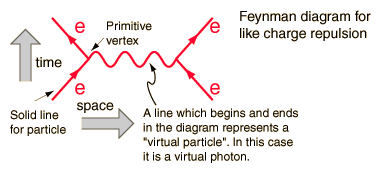Does every particle with mass interact with every other particle with mass in the universe gravitationally? If so, would each particle have to emit an infinite amount of gravitons? Otherwise some other particles out there might be missed and not interacted with especially as the range increases.
-
2$\begingroup$ This is related. $\endgroup$– user8718165Commented Oct 28, 2019 at 3:51
-
1$\begingroup$ Those kinds of gravitons are virtual gravitons. They aren't real particles whose energy and momentum you could measure. They’re just lines in Feynman diagrams for quantum gravity representing mathematical expressions. $\endgroup$– G. SmithCommented Oct 28, 2019 at 3:53
-
1$\begingroup$ You could ask the same question about charged particles and (virtual) photons. $\endgroup$– G. SmithCommented Oct 28, 2019 at 3:57
1 Answer
It is analogous with the electric field interactions. Classically all charges create fields around them, with which a test charge can interact and plot the field, depending on the topology of the charges. Again classically all masses create a gravitational field around them and empty space has the gravitational field coming from all these masses.
In electromagnetism,it is photons, quantum mechanical entities, that transfer energy by interacting. The way the electric field of static charges is built up in this quantum mechanical model is by the mathematics of virtual particles.
This Feynman diagram represents an integral which, when calculated, will give the probability of an electron to scatter off an electron. The intermediate line is an off mass shell particle, which means its four vector is variable under the integration and not on the mass of the particle.
In order to understand how a static electric field can be represented quantum mechanically one has to take limits with these virtual particles, not real on mass shell photons.
Gravitons are the hypothetical exchange particle in the gravitation interaction at the quantum mechanical level, analogous to the photon for electromagnetism.. We have to make the hypothesis that they exist.
Analogous to the electric field, the gravitational field of masses will be built up by off mass shell gravitons, i.e. the interaction between a planet and the sun hypothetically will be happening with off mass shell gravitons. A classical gravitational field will be built up by the limit of off mass shell virtual particles.
Does every particle with mass interact with every other particle with mass in the universe gravitationally?
Yes.
If so, would each particle have to emit an infinite amount of gravitons?
Not of gravitons, of virtual gravitons under an integration, and those cane be infinite.
Otherwise some other particles out there might be missed and not interacted with especially as the range increases.
Nothing is missed when integrations take place.
I hope you realize that to really understand all of the above introduction many physics courses have to be studied.

